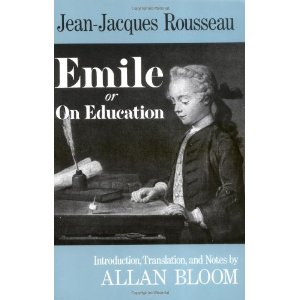Jean-Jacques Rousseau, Emile: or On Education, translated with notes and an introduction by Allan Bloom, Basic Books, 1979.
Excerpt:
Here then we have Rousseau’s response to Plato. Plato said that all men always begin by being prisoners in the cave. The cave is civil society considered in its effect on the mind of those who belong to it. Their needs, fears, hopes, and indignations produce a network of opinions and myths which make communal life possible and give it meaning. Men never experience nature directly but always mix their beliefs into what they see. Liberation from the cave requires the discovery of nature under the many layers of convention, the separating out of what is natural from what is man-made. Only a genius is capable of attaining a standpoint from which he can see the cave as a cave. That is why the philosopher, the rarest human type, can alone be autonomous and free of prejudice. Now, Rousseau agrees that once in the cave, genius is required to emerge from it. He also agrees that enlightenment is spurious and merely the substitution of one prejudice for another. He himself was born in a cave and had to be a genius to attain his insight into the human condition. His life is a testimony to the heroic character of the quest for nature. But he denies that the cave is natural. The right kind of education, one independent of society, can put a child into direct contact with nature without the intermixture of opinion. Plato purified poetry so as to make its view of the world less hostile to reason, and he replaced the ordinary lies by a noble lie. Rousseau banishes poetry altogether and suppresses all lies. At most he gives Emile Robinson Crusoe, who is not an “other” but only himself. Above all, no gods. At the age of fifteen, Emile has a standpoint outside of civil society, one fixed by his inclinations and his reason, from which he sees that his fellow men are prisoners in a cave and by which he is freed from any temptation to fear the punishments or seek the honors which are part of it. Rousseau, the genius, has made it possible for ordinary men to be free, and in this way he proves in principle the justice of democracy.
Thus Rousseau’s education of the young Emile confines itself to fostenng the development of the faculties immediately connected with his preservation. His desire for the pleasant and avoidance of the painful are given by nature. His senses are the natural means to those ends. And the physical sciences, like mathematics, physics, and astronomy, are human contrivances which, if solidly grounded on the pure experience of the senses, extend the range of the senses and protect them from the errors of imagination. The tutor’s responsibility is, in the first place, to let the senses develop in relation to their proper objects; and, secondly, to encourage the learning of the sciences as the almost natural outcome of the use of the senses. Rousseau calls this tutelage, particularly with reference to the part that has to do with the senses, negative education. All animals go through a similar apprenticeship to life. But with man something intervenes that impedes or distorts nature’s progress, and therefore a specifically negative education, a human effort, is required. This new factor is the growth of the passions, particularly fear of death and amour-propre. Fed by imagination and intermingling with the desires and the senses, they transform judgment and lead to a special kind of merely human, or mythical, interpretation of the world. Negative education means specifically the tutor’s artifices invented for the purpose of preventing the emergence of these two passions which attach men to one another and to opinions.
Online:
Google Books
Amazon

